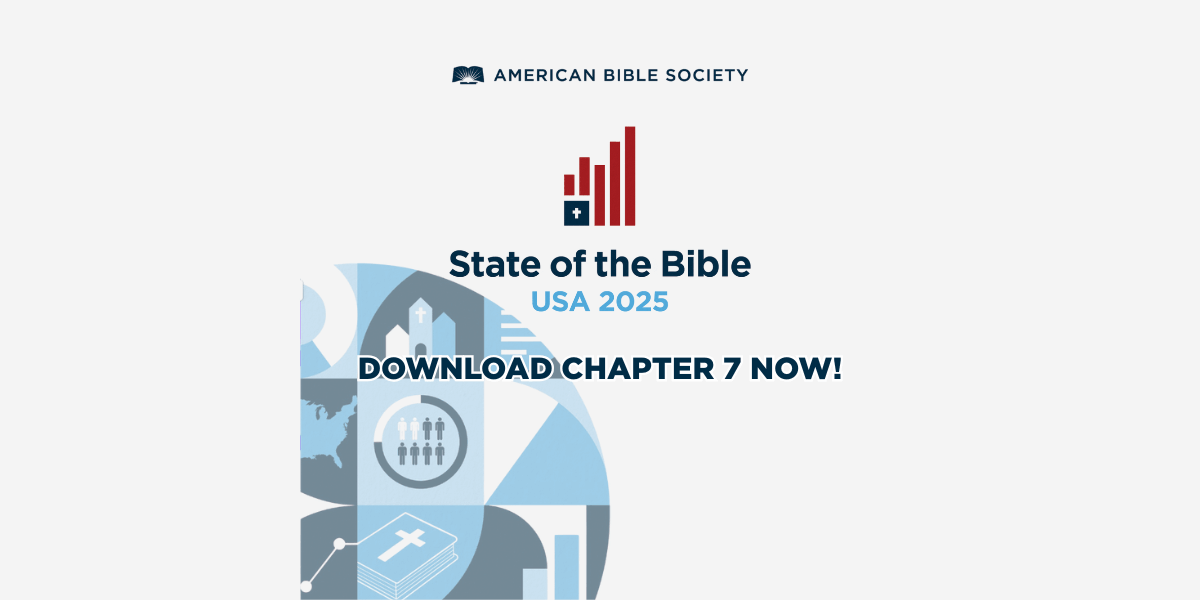American Bible Society today released the seventh chapter of their 15th annual State of the Bible report. This new chapter examines trust in two different contexts: interpersonal and institutional. More specifically, it reveals data that delineates respondents’ levels of trust by categories such as political affiliation, experience with certain traumas, level of Scripture engagement, and generation. The seventh chapter of State of the Bible: USA 2025 is available now for download at StateoftheBible.org.
“A half-century ago, Americans generally trusted the Bible. Attitudes are more complex these days,” says John Farquhar Plake, Chief Innovation Officer at American Bible Society and editor-in-chief of the State of the Bible series. “Our latest survey finds a mixture of belief and questioning in the American public. It’s true that nearly one in five Americans think the Bible was written to control and manipulate, but twice that many trust the Bible as ‘totally accurate in all the principles it presents.’ The numbers show a nation grappling with Scripture—and its meaning for our lives.”
To gather the findings about social institutions, the survey asked respondents to rate their level of trust in these eight categories: Families, Medicine, Education, Religion, Arts & Entertainment, Banking & Business, Government, and Media. Regarding interpersonal trust, the survey asked questions about how much people agreed or disagreed with five statements about trusting others: “Most people are basically honest”; “Most people are trustworthy”; “I am trusting of others”; “Most people are sincere and well-intentioned”; “People will usually keep their promises if they make them.”
State of the Bible findings come from a nationally representative survey performed for American Bible Society by NORC at the University of Chicago, using their AmeriSpeak panel. The data came from 2,656 online interviews with American adults in all 50 states and the District of Columbia. Data were collected from January 2–21, 2025.
Key findings analyzed in Chapter 7: Trust
- More than one-third (36%) of Americans trust that the Bible is totally accurate in all the principles it presents, while 39% are skeptical (page 149).
-
- In terms of mistrust, almost one-fifth of the public believe that the Bible was written to control or manipulate other people (page 150).
- Trust in the institution of Family ranks the highest at 55%, while Media and Government are the least trusted institutions among the American public, with only 5 and 6 percent of respondents (respectively) reporting high or very high trust (page 131).
-
- Trust in Religion falls in the middle of the eight categories, with 29% of American adults reporting high or very high levels of trust.
-
- Trust in Religion is more prevalent among the oldest generation (Boomers+) than it is among younger generations (page 136).
- When Republicans and Democrats are Scripture Engaged, their interpersonal trust levels are nearly equal. Among those who are Bible Disengaged, Democrats score slightly higher in trust than Republicans, and both score far higher than Independents (page 139).
- Interpersonal trauma damages trust. Trust scores drop for those who have experienced assault, abuse, or unwanted sexual contact (page 146).
-
- Almost half (46%) of Americans have experienced or witnessed some kind of trauma, interpersonal or otherwise. The vast majority (89%) of those affected by trauma say it still impacts them today (143).
- There is a positive correlation between forgiveness and trust, with 34% of individuals who are able to forgive experiencing high levels of trust, and 51% of individuals who are unable to forgive reporting low levels of trust (page 147).
Continuing monthly through the remainder of 2025, American Bible Society will release the final two chapters in this year’s State of the Bible story. Upcoming findings look at behaviors toward friends and neighbors and generosity. To download the seventh chapter of State of the Bible 2025, visit StateoftheBible.org.





